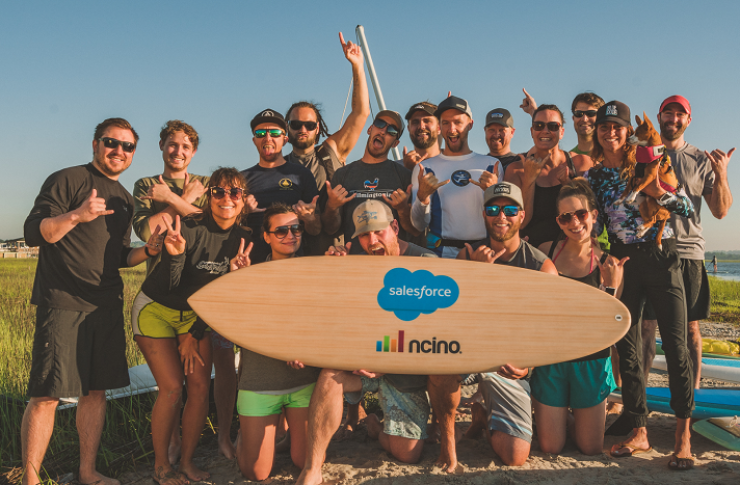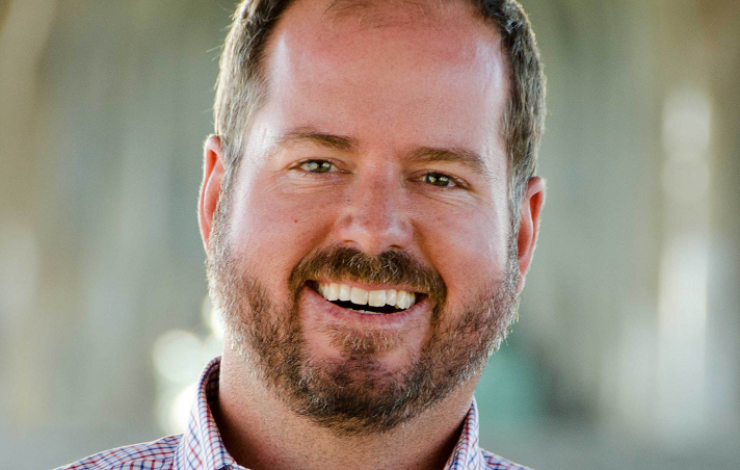At the cloud-banking startup nCino, testing whether potential hires are a cultural fit sometimes means handing them a beer or getting them on a paddleboard.
The office is just a bike ride away from the boardwalk along Wrightsville Beach in Wilmington, N.C., and employees like to get together there at sunrise.
"Most of the employees who live here enjoy the water or the beach," said Jonathan Rowe, the chief marketing officer. "We all get out, as the sun comes up, and go paddleboarding."
"We bring people out to very cultural experiences which are nCino to see how they are from a comfort level, to see how excited they are," Rowe continued. "You can really see, in those situations, people who fit in with the culture."
The fintech industry certainly has its cultural quirks, whether it is beer kegs in the breakroom, yoga classes at the office or subsidized corporate logo tattoos (no, really). But for the savvy companies selected as the
The
Sounds simple, but if it were easy, everybody would do it. In reality, hiring for culture requires a major upfront investment of time and resources, and a considerable amount of discipline. And providing new hires a sense of larger purpose requires having one in the first place.
Involve the Whole Crew
Executives at the companies on this year’s Best Fintechs to Work For list described hiring processes that are methodical, time-consuming, and at times, frustrating.
"It’s not easy to get hired at CSI," said Bill Perrin, chief human resources officer for Computer Services Inc. in Paducah, Ky. "We hire slow. We’re never in a rush."

Typically, the companies with employees who reported high levels of engagement and job satisfaction have put systems in place that bring multiple people into the vetting process from different departments of the company, representing different levels of seniority.
"We learned this the hard way," said Brett Crosby, chief operating officer and co-founder of PeerStreet, an El Segundo, Calif., startup that provides a platform for individuals to invest in residential real estate loans.
Crosby said that in the past, he or his co-founder, Chief Executive Brew Johnson, might make a prospect an offer on their own, with mixed results.
(
"What we’ve found is that it always works better when we do the whole hiring process, we get everyone together," Crosby said. "It gets multiple people thinking about how that candidate is going to fit in and whether they are a good culture fit. Then we all get together and we review that candidate."
Though time consuming, it "sets the foundation" for success, he said. "If you don’t have buy-in from the larger group that this person is the right fit, it’s much more likely that the body rejects the organ."
Johnson said that how prospective hires interact with more junior members of the staff is often the most telling.
"Some of the best insights in the hiring process — pulling insights from something or warning signs — can come from a very junior person," he said.
"We’ve seen candidates who sit down with me and they interact in a completely different way than they interact with someone who is junior on the team. Is that a good sign for someone on a team that works really collaboratively? Of course not. You don’t want somebody who looks down on somebody just because they don’t have a C-level title."
Be Consistent
Maintaining strong cultural standards in the hiring process can take a lot of discipline, particularly when job candidates with the right technical credentials are hard to find from the start.
"Our core employees are our software developers and our networking and telecommunication people," Perrin at CSI said. And southwest Kentucky isn’t exactly Silicon Valley when it comes to finding highly trained technology talent.
All the people with these skills — if they want to work — already have a job, he said. So forget about the pool of unemployed that might help with filling other positions.
Even so, every potential hire goes through a strict vetting process, Perrin said.
"They go through several tests, and then they probably will interview with five or six people besides their hiring manager and besides human resources," he said. "We do peer interviews also, to see if it’s a fit."

At many companies, a job candidate’s failure to hit it off, even if it’s with members of a department not directly related to their position, can doom their chances.
Promontory Interfinancial Network has candidates sit for a battery of interviews, including a series of four two-on-one sessions with representatives of the company’s major departments.
"There are many, many occasions where a different department raises an objection," said CEO Mark Jacobsen. "And what takes discipline is, to tell a department in desperate need of a candidate that they thought would be a fit, ‘I’m sorry, it’s not going to work. It’s not a fit for the company.'"
Jacobsen acknowledged that the "very rigorous" gauntlet of interviews is hard on the candidates too. "I’m certainly not envious of anyone who has to go through it," he said.
But it’s not all murder boards and personality tests either. At nCino, potential hires get introduced around in a much more casual way.
"We have kegs at the office here and every Friday, late afternoon, everyone gathers in the kitchen around the kegs, has a beer and relaxes a little bit," Rowe said. "Oftentimes, when we have candidates who are interviewing, we bring them to those sessions because it’s a great way for us to see them in a little more of a relaxed environment and not only interacting with the people they are interviewing with, but with the rest of the company. I think that really showcases the fit from a cultural standpoint."
Clarify Why the Mission Matters
Once the right people are on board, the goal is keeping them motivated, according to managers at the Best Fintechs to Work For.
The key to achieving that is making sure employees feel like they are part of a mission that extends far beyond the company’s bottom line.
"Almost any successful company you see, especially in the startup phase, has really had to have some fundamental mission about improving access to something, transparency, better control, and improving people’s lives," PeerStreet's Crosby said.
What Crosby tries to instill in employees is the belief that they are having a positive impact on society by helping extend credit to people buying or improving homes.
"These borrowers are improving their communities, one house at a time," he said. "If you do one project in a neighborhood, you improve that neighborhood. If you do that 30 times in an area, you’ve really improved that entire community. You’ve taken out a lot of the blighted houses and you’re really started to change the dynamic of that area. And you’ve created local jobs in a pretty meaningful way. You bring business to local stores. In my opinion, it’s capitalism done right."
Evan Singer, the CEO of SmartBiz loans, views its mission — improving companies’ access to Small Business Administration loans and other forms of credit — as a “noble” one.
"We kind of see ourselves as the 'white knight' in small-business lending," he said.
Singer points out to his employees that they are helping build businesses, which in turn creates jobs and strengthens the economy. "Our mission really makes a difference in these people’s lives and, absolutely, I think it’s a critical part to what we do and why people are excited to come to work every day," he said.

For some of the companies on the list, the social mission is explicit in their business model.
"We have a fairly unique culture within fintech in that we’re a social-impact-driven company," said Lana Bronipolsky, chief financial officer of MPOWER Financing, which helps international students in the United States access education loans. "Everybody that comes to work for MPOWER has a passion for access to higher education, a passion for financial inclusion, a passion for upward socioeconomic mobility, and they bring that to work with them every single day."
Others have a more traditional business model with a social mission specifically grafted on top of it.
At Cross River Bank in Fort Lee, N.J., Chief People Officer Marc Miller said that connecting people to something greater than themselves is a key part of his job. "I want them to feel that their work is meaningful and that what the company stands for is meaningful."
With social responsibility baked into the ethics of the company and manifested in extensive charitable activities, Miller said, it’s easier to tell employees that "what we do here is meaningful to the world at large."
For example, when management at Cross River learned that an employee was active in a program that gives disabled children the opportunity to interact with, and even ride, horses, the company made a donation to the organization in her name. Likewise, when another Cross River employee got involved in a local charity that helps teach underprivileged children to swim, the company offered the program financial support.
That makes working for Cross River meaningful to employees, Miller said. “That flows through the organization in a very purposeful way, where people feel like, 'I’m not just working for a company that’s making money and doing whatever they’re doing in terms of trying to make the world a better place. But, in addition, their value system and their core is really connected to giving back to the community and really appreciating its place — all of our places — in this world.' "
Whatever the source of the greater meaning that employees find in their work, it translates into something managers consistently identified as "passion."
Despite being intangible, that passion delivers tangible results. MPOWER’s revenues grew by a remarkable 3,000% between 2015 and 2017.
Bronipolsky credits employees’ passion for improving access to higher education. "It translates to better employee engagement and it translates to our growth that we’ve seen as a company over the past three years," she said.
Steve Smith, founder and CEO of Finicity, which provides personal finance information and guidance to consumers, said that helping employees understand that they are providing a service that can change lives for the better creates a positive feedback loop.
"You get people who are passionate about that," he said, "and when you bring passion to the workplace, that’s a great thing."





